Characteristics and Qualities of an Entrepreneur
VerifiedAdded on 2023/01/18
|10
|1951
|68
AI Summary
This report discusses the qualities and characteristics of an entrepreneur, with a focus on social entrepreneurs. It also explores the challenges faced by social enterprises. The case study of Fairphone, a social enterprise founded by Ban van Abel, is used to illustrate these concepts.
Contribute Materials
Your contribution can guide someone’s learning journey. Share your
documents today.
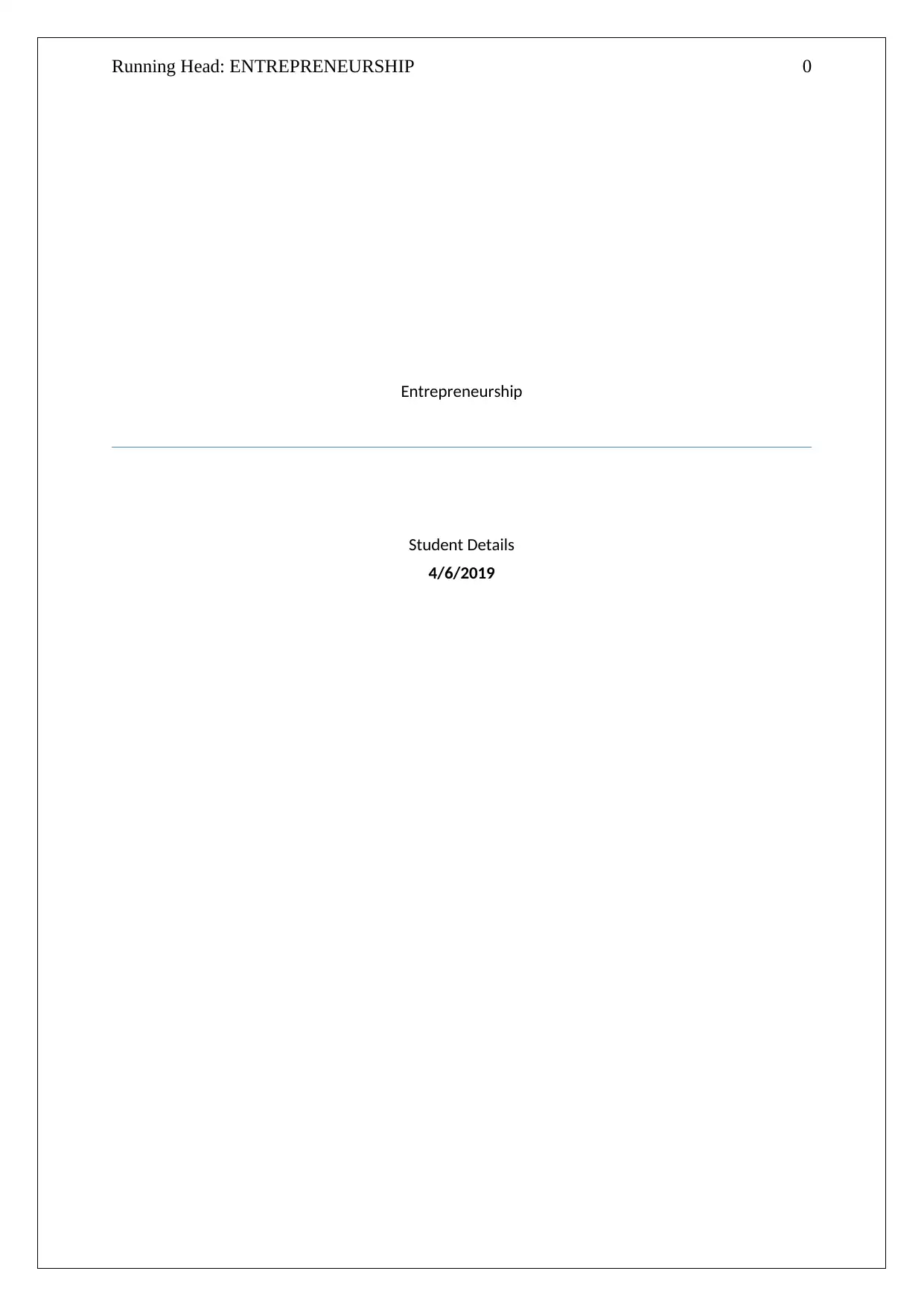
Running Head: ENTREPRENEURSHIP 0
Entrepreneurship
Student Details
4/6/2019
Entrepreneurship
Student Details
4/6/2019
Secure Best Marks with AI Grader
Need help grading? Try our AI Grader for instant feedback on your assignments.
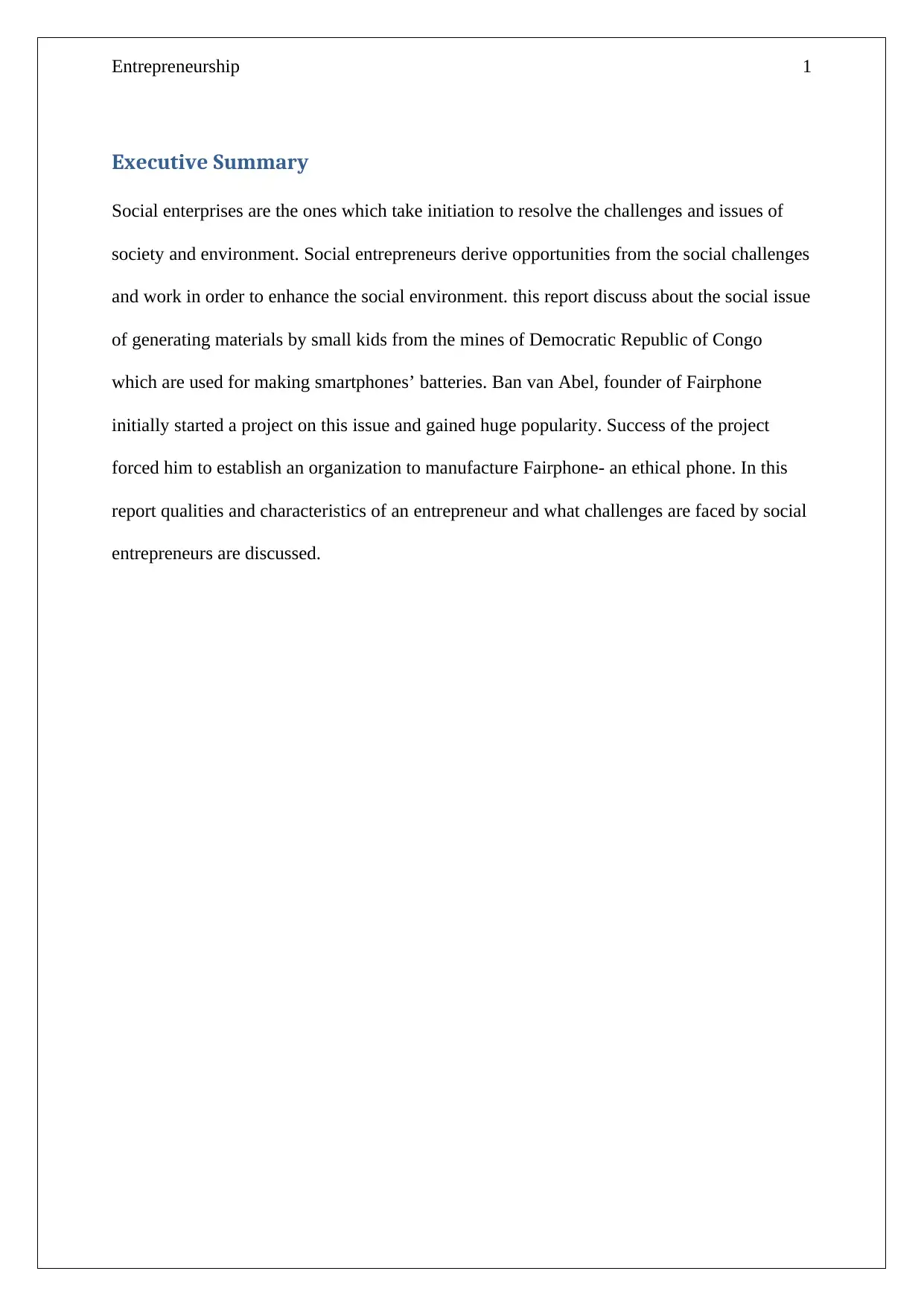
Entrepreneurship 1
Executive Summary
Social enterprises are the ones which take initiation to resolve the challenges and issues of
society and environment. Social entrepreneurs derive opportunities from the social challenges
and work in order to enhance the social environment. this report discuss about the social issue
of generating materials by small kids from the mines of Democratic Republic of Congo
which are used for making smartphones’ batteries. Ban van Abel, founder of Fairphone
initially started a project on this issue and gained huge popularity. Success of the project
forced him to establish an organization to manufacture Fairphone- an ethical phone. In this
report qualities and characteristics of an entrepreneur and what challenges are faced by social
entrepreneurs are discussed.
Executive Summary
Social enterprises are the ones which take initiation to resolve the challenges and issues of
society and environment. Social entrepreneurs derive opportunities from the social challenges
and work in order to enhance the social environment. this report discuss about the social issue
of generating materials by small kids from the mines of Democratic Republic of Congo
which are used for making smartphones’ batteries. Ban van Abel, founder of Fairphone
initially started a project on this issue and gained huge popularity. Success of the project
forced him to establish an organization to manufacture Fairphone- an ethical phone. In this
report qualities and characteristics of an entrepreneur and what challenges are faced by social
entrepreneurs are discussed.
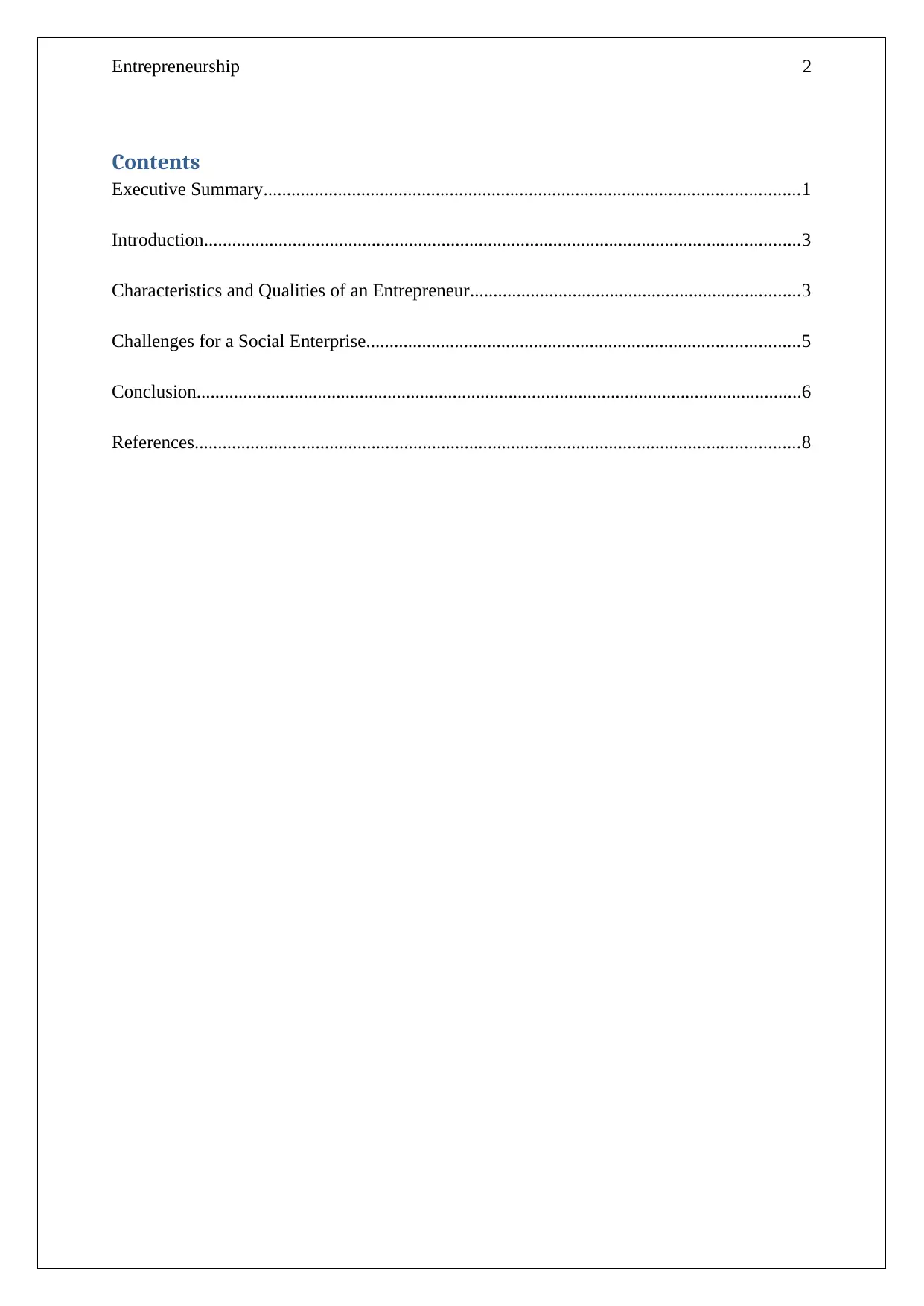
Entrepreneurship 2
Contents
Executive Summary...................................................................................................................1
Introduction................................................................................................................................3
Characteristics and Qualities of an Entrepreneur.......................................................................3
Challenges for a Social Enterprise.............................................................................................5
Conclusion..................................................................................................................................6
References..................................................................................................................................8
Contents
Executive Summary...................................................................................................................1
Introduction................................................................................................................................3
Characteristics and Qualities of an Entrepreneur.......................................................................3
Challenges for a Social Enterprise.............................................................................................5
Conclusion..................................................................................................................................6
References..................................................................................................................................8
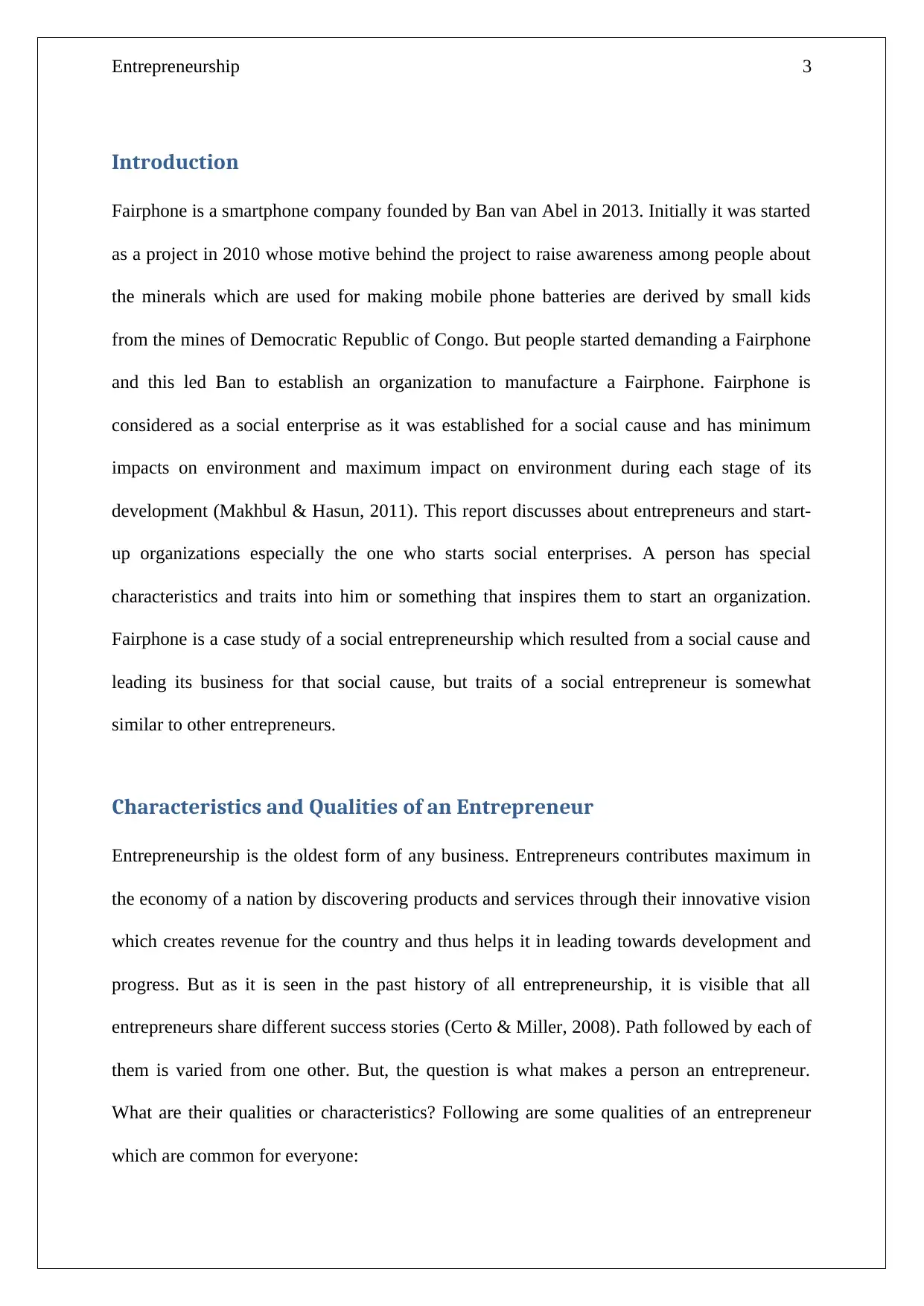
Entrepreneurship 3
Introduction
Fairphone is a smartphone company founded by Ban van Abel in 2013. Initially it was started
as a project in 2010 whose motive behind the project to raise awareness among people about
the minerals which are used for making mobile phone batteries are derived by small kids
from the mines of Democratic Republic of Congo. But people started demanding a Fairphone
and this led Ban to establish an organization to manufacture a Fairphone. Fairphone is
considered as a social enterprise as it was established for a social cause and has minimum
impacts on environment and maximum impact on environment during each stage of its
development (Makhbul & Hasun, 2011). This report discusses about entrepreneurs and start-
up organizations especially the one who starts social enterprises. A person has special
characteristics and traits into him or something that inspires them to start an organization.
Fairphone is a case study of a social entrepreneurship which resulted from a social cause and
leading its business for that social cause, but traits of a social entrepreneur is somewhat
similar to other entrepreneurs.
Characteristics and Qualities of an Entrepreneur
Entrepreneurship is the oldest form of any business. Entrepreneurs contributes maximum in
the economy of a nation by discovering products and services through their innovative vision
which creates revenue for the country and thus helps it in leading towards development and
progress. But as it is seen in the past history of all entrepreneurship, it is visible that all
entrepreneurs share different success stories (Certo & Miller, 2008). Path followed by each of
them is varied from one other. But, the question is what makes a person an entrepreneur.
What are their qualities or characteristics? Following are some qualities of an entrepreneur
which are common for everyone:
Introduction
Fairphone is a smartphone company founded by Ban van Abel in 2013. Initially it was started
as a project in 2010 whose motive behind the project to raise awareness among people about
the minerals which are used for making mobile phone batteries are derived by small kids
from the mines of Democratic Republic of Congo. But people started demanding a Fairphone
and this led Ban to establish an organization to manufacture a Fairphone. Fairphone is
considered as a social enterprise as it was established for a social cause and has minimum
impacts on environment and maximum impact on environment during each stage of its
development (Makhbul & Hasun, 2011). This report discusses about entrepreneurs and start-
up organizations especially the one who starts social enterprises. A person has special
characteristics and traits into him or something that inspires them to start an organization.
Fairphone is a case study of a social entrepreneurship which resulted from a social cause and
leading its business for that social cause, but traits of a social entrepreneur is somewhat
similar to other entrepreneurs.
Characteristics and Qualities of an Entrepreneur
Entrepreneurship is the oldest form of any business. Entrepreneurs contributes maximum in
the economy of a nation by discovering products and services through their innovative vision
which creates revenue for the country and thus helps it in leading towards development and
progress. But as it is seen in the past history of all entrepreneurship, it is visible that all
entrepreneurs share different success stories (Certo & Miller, 2008). Path followed by each of
them is varied from one other. But, the question is what makes a person an entrepreneur.
What are their qualities or characteristics? Following are some qualities of an entrepreneur
which are common for everyone:
Secure Best Marks with AI Grader
Need help grading? Try our AI Grader for instant feedback on your assignments.
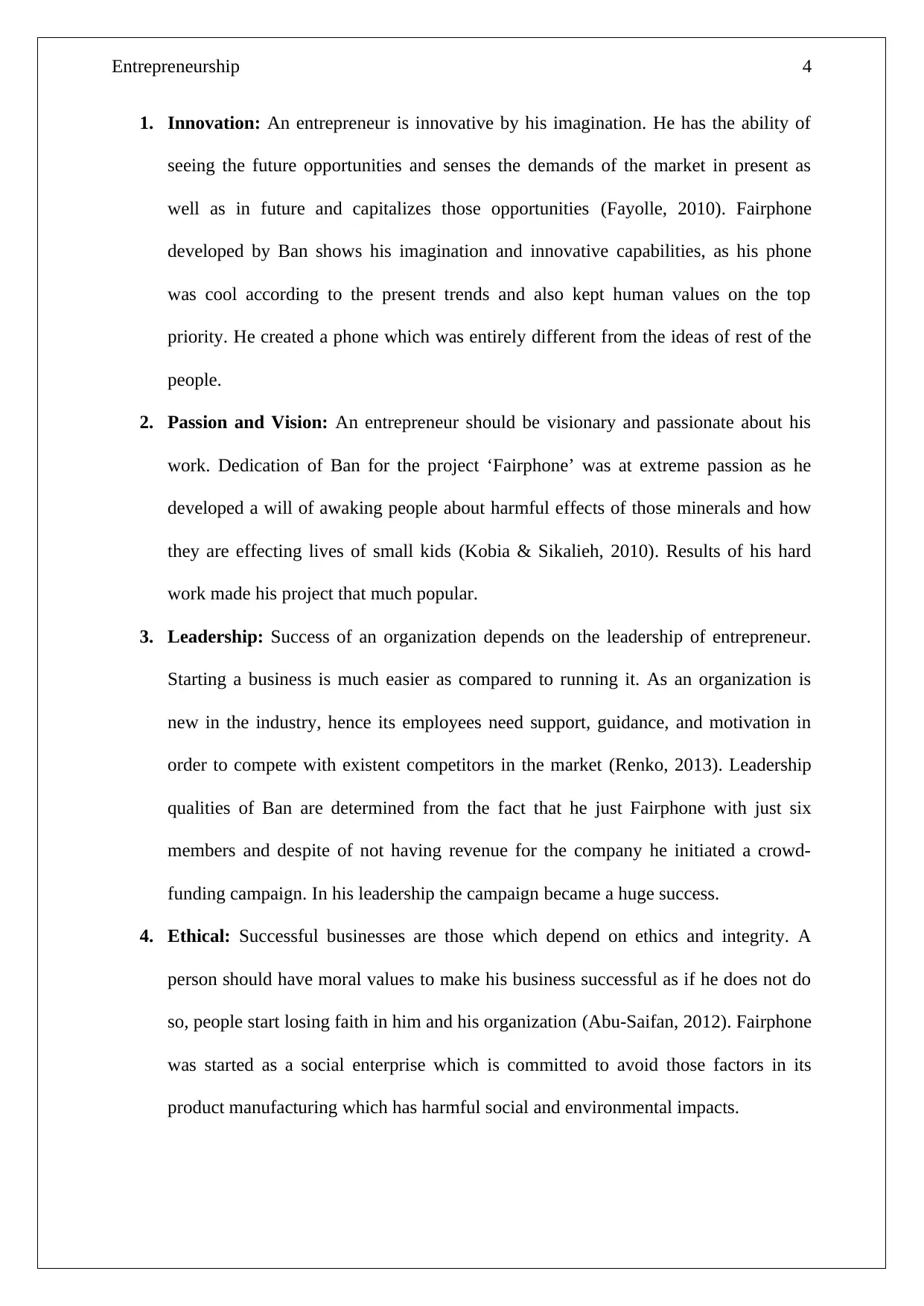
Entrepreneurship 4
1. Innovation: An entrepreneur is innovative by his imagination. He has the ability of
seeing the future opportunities and senses the demands of the market in present as
well as in future and capitalizes those opportunities (Fayolle, 2010). Fairphone
developed by Ban shows his imagination and innovative capabilities, as his phone
was cool according to the present trends and also kept human values on the top
priority. He created a phone which was entirely different from the ideas of rest of the
people.
2. Passion and Vision: An entrepreneur should be visionary and passionate about his
work. Dedication of Ban for the project ‘Fairphone’ was at extreme passion as he
developed a will of awaking people about harmful effects of those minerals and how
they are effecting lives of small kids (Kobia & Sikalieh, 2010). Results of his hard
work made his project that much popular.
3. Leadership: Success of an organization depends on the leadership of entrepreneur.
Starting a business is much easier as compared to running it. As an organization is
new in the industry, hence its employees need support, guidance, and motivation in
order to compete with existent competitors in the market (Renko, 2013). Leadership
qualities of Ban are determined from the fact that he just Fairphone with just six
members and despite of not having revenue for the company he initiated a crowd-
funding campaign. In his leadership the campaign became a huge success.
4. Ethical: Successful businesses are those which depend on ethics and integrity. A
person should have moral values to make his business successful as if he does not do
so, people start losing faith in him and his organization (Abu-Saifan, 2012). Fairphone
was started as a social enterprise which is committed to avoid those factors in its
product manufacturing which has harmful social and environmental impacts.
1. Innovation: An entrepreneur is innovative by his imagination. He has the ability of
seeing the future opportunities and senses the demands of the market in present as
well as in future and capitalizes those opportunities (Fayolle, 2010). Fairphone
developed by Ban shows his imagination and innovative capabilities, as his phone
was cool according to the present trends and also kept human values on the top
priority. He created a phone which was entirely different from the ideas of rest of the
people.
2. Passion and Vision: An entrepreneur should be visionary and passionate about his
work. Dedication of Ban for the project ‘Fairphone’ was at extreme passion as he
developed a will of awaking people about harmful effects of those minerals and how
they are effecting lives of small kids (Kobia & Sikalieh, 2010). Results of his hard
work made his project that much popular.
3. Leadership: Success of an organization depends on the leadership of entrepreneur.
Starting a business is much easier as compared to running it. As an organization is
new in the industry, hence its employees need support, guidance, and motivation in
order to compete with existent competitors in the market (Renko, 2013). Leadership
qualities of Ban are determined from the fact that he just Fairphone with just six
members and despite of not having revenue for the company he initiated a crowd-
funding campaign. In his leadership the campaign became a huge success.
4. Ethical: Successful businesses are those which depend on ethics and integrity. A
person should have moral values to make his business successful as if he does not do
so, people start losing faith in him and his organization (Abu-Saifan, 2012). Fairphone
was started as a social enterprise which is committed to avoid those factors in its
product manufacturing which has harmful social and environmental impacts.
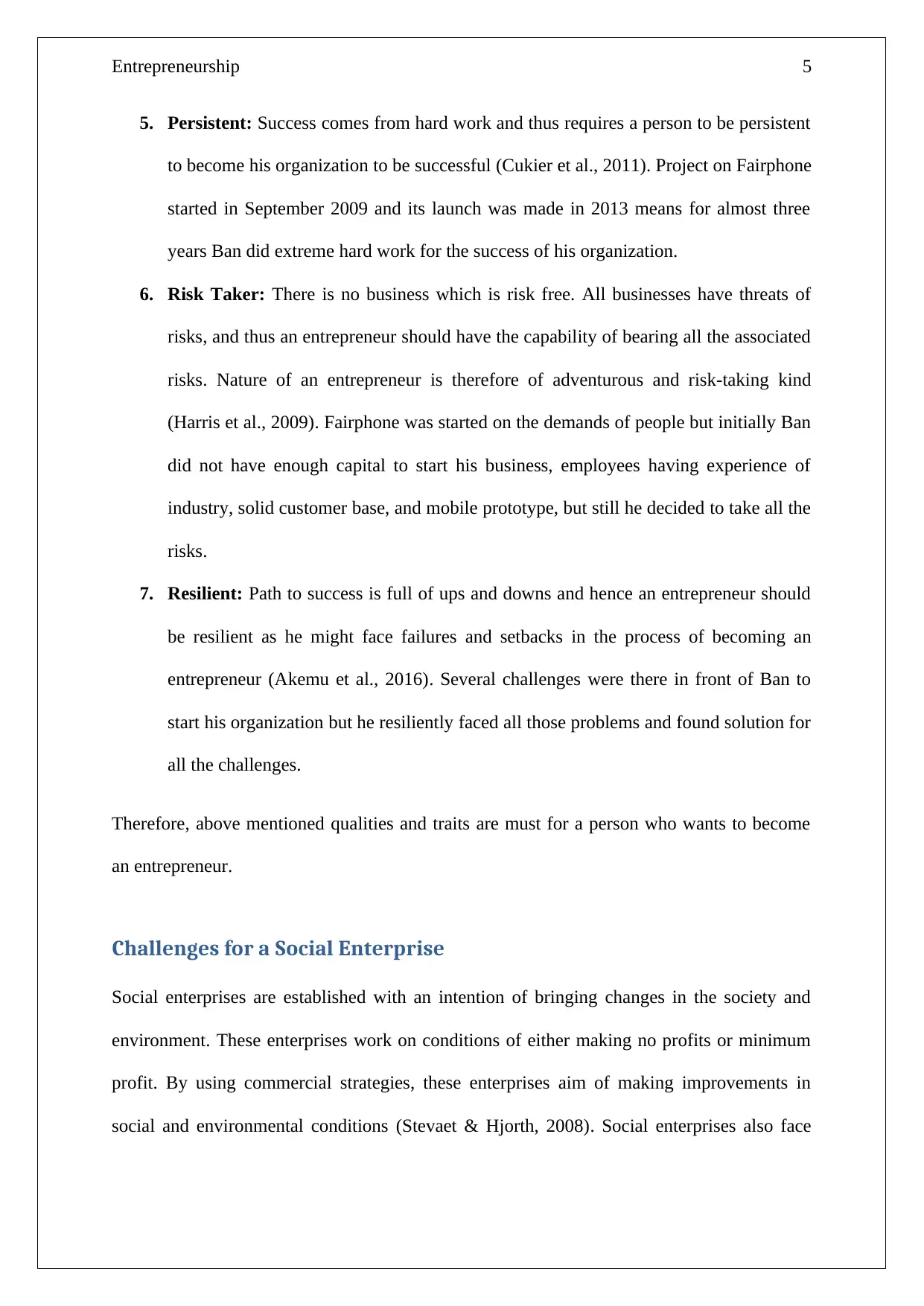
Entrepreneurship 5
5. Persistent: Success comes from hard work and thus requires a person to be persistent
to become his organization to be successful (Cukier et al., 2011). Project on Fairphone
started in September 2009 and its launch was made in 2013 means for almost three
years Ban did extreme hard work for the success of his organization.
6. Risk Taker: There is no business which is risk free. All businesses have threats of
risks, and thus an entrepreneur should have the capability of bearing all the associated
risks. Nature of an entrepreneur is therefore of adventurous and risk-taking kind
(Harris et al., 2009). Fairphone was started on the demands of people but initially Ban
did not have enough capital to start his business, employees having experience of
industry, solid customer base, and mobile prototype, but still he decided to take all the
risks.
7. Resilient: Path to success is full of ups and downs and hence an entrepreneur should
be resilient as he might face failures and setbacks in the process of becoming an
entrepreneur (Akemu et al., 2016). Several challenges were there in front of Ban to
start his organization but he resiliently faced all those problems and found solution for
all the challenges.
Therefore, above mentioned qualities and traits are must for a person who wants to become
an entrepreneur.
Challenges for a Social Enterprise
Social enterprises are established with an intention of bringing changes in the society and
environment. These enterprises work on conditions of either making no profits or minimum
profit. By using commercial strategies, these enterprises aim of making improvements in
social and environmental conditions (Stevaet & Hjorth, 2008). Social enterprises also face
5. Persistent: Success comes from hard work and thus requires a person to be persistent
to become his organization to be successful (Cukier et al., 2011). Project on Fairphone
started in September 2009 and its launch was made in 2013 means for almost three
years Ban did extreme hard work for the success of his organization.
6. Risk Taker: There is no business which is risk free. All businesses have threats of
risks, and thus an entrepreneur should have the capability of bearing all the associated
risks. Nature of an entrepreneur is therefore of adventurous and risk-taking kind
(Harris et al., 2009). Fairphone was started on the demands of people but initially Ban
did not have enough capital to start his business, employees having experience of
industry, solid customer base, and mobile prototype, but still he decided to take all the
risks.
7. Resilient: Path to success is full of ups and downs and hence an entrepreneur should
be resilient as he might face failures and setbacks in the process of becoming an
entrepreneur (Akemu et al., 2016). Several challenges were there in front of Ban to
start his organization but he resiliently faced all those problems and found solution for
all the challenges.
Therefore, above mentioned qualities and traits are must for a person who wants to become
an entrepreneur.
Challenges for a Social Enterprise
Social enterprises are established with an intention of bringing changes in the society and
environment. These enterprises work on conditions of either making no profits or minimum
profit. By using commercial strategies, these enterprises aim of making improvements in
social and environmental conditions (Stevaet & Hjorth, 2008). Social enterprises also face
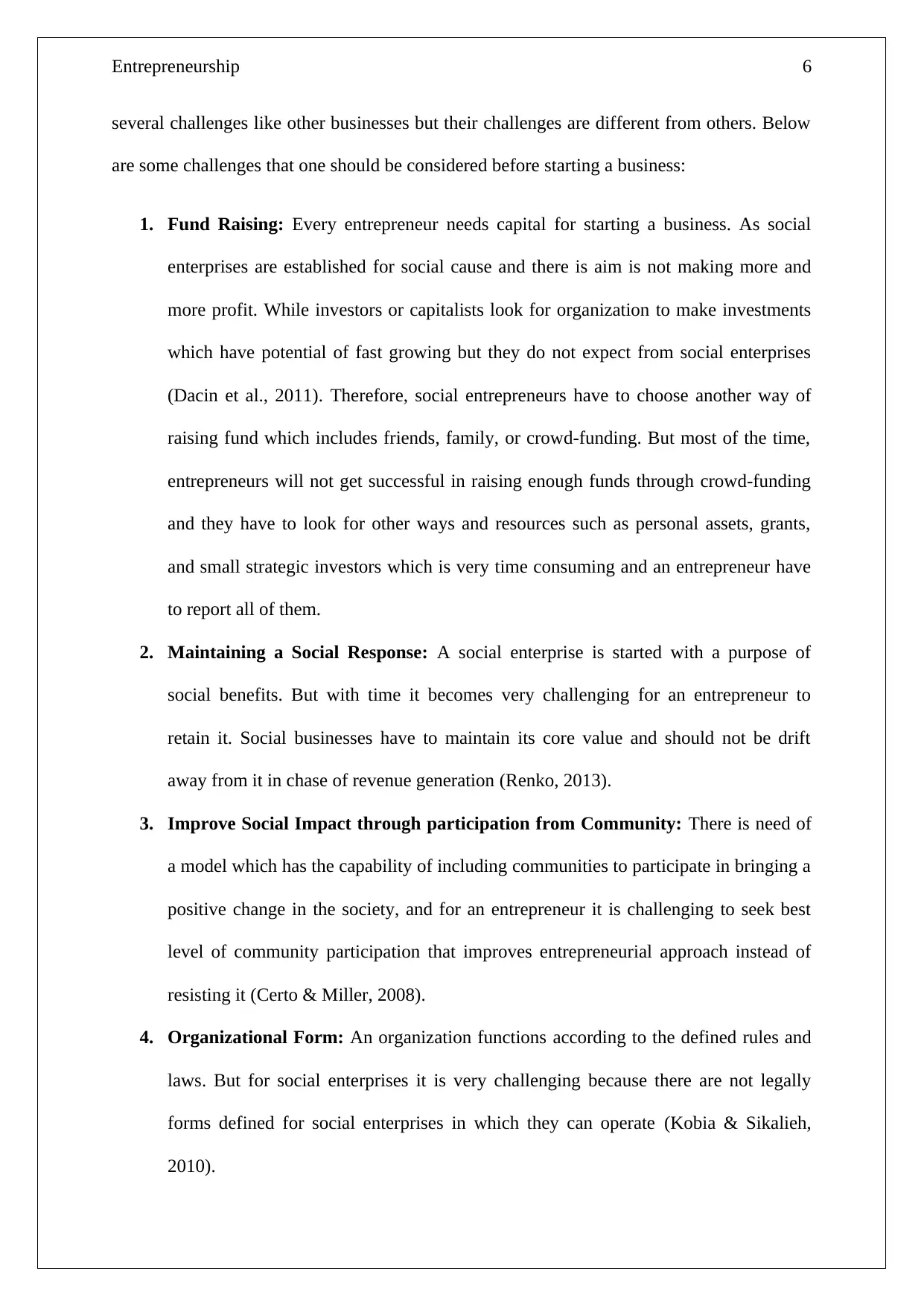
Entrepreneurship 6
several challenges like other businesses but their challenges are different from others. Below
are some challenges that one should be considered before starting a business:
1. Fund Raising: Every entrepreneur needs capital for starting a business. As social
enterprises are established for social cause and there is aim is not making more and
more profit. While investors or capitalists look for organization to make investments
which have potential of fast growing but they do not expect from social enterprises
(Dacin et al., 2011). Therefore, social entrepreneurs have to choose another way of
raising fund which includes friends, family, or crowd-funding. But most of the time,
entrepreneurs will not get successful in raising enough funds through crowd-funding
and they have to look for other ways and resources such as personal assets, grants,
and small strategic investors which is very time consuming and an entrepreneur have
to report all of them.
2. Maintaining a Social Response: A social enterprise is started with a purpose of
social benefits. But with time it becomes very challenging for an entrepreneur to
retain it. Social businesses have to maintain its core value and should not be drift
away from it in chase of revenue generation (Renko, 2013).
3. Improve Social Impact through participation from Community: There is need of
a model which has the capability of including communities to participate in bringing a
positive change in the society, and for an entrepreneur it is challenging to seek best
level of community participation that improves entrepreneurial approach instead of
resisting it (Certo & Miller, 2008).
4. Organizational Form: An organization functions according to the defined rules and
laws. But for social enterprises it is very challenging because there are not legally
forms defined for social enterprises in which they can operate (Kobia & Sikalieh,
2010).
several challenges like other businesses but their challenges are different from others. Below
are some challenges that one should be considered before starting a business:
1. Fund Raising: Every entrepreneur needs capital for starting a business. As social
enterprises are established for social cause and there is aim is not making more and
more profit. While investors or capitalists look for organization to make investments
which have potential of fast growing but they do not expect from social enterprises
(Dacin et al., 2011). Therefore, social entrepreneurs have to choose another way of
raising fund which includes friends, family, or crowd-funding. But most of the time,
entrepreneurs will not get successful in raising enough funds through crowd-funding
and they have to look for other ways and resources such as personal assets, grants,
and small strategic investors which is very time consuming and an entrepreneur have
to report all of them.
2. Maintaining a Social Response: A social enterprise is started with a purpose of
social benefits. But with time it becomes very challenging for an entrepreneur to
retain it. Social businesses have to maintain its core value and should not be drift
away from it in chase of revenue generation (Renko, 2013).
3. Improve Social Impact through participation from Community: There is need of
a model which has the capability of including communities to participate in bringing a
positive change in the society, and for an entrepreneur it is challenging to seek best
level of community participation that improves entrepreneurial approach instead of
resisting it (Certo & Miller, 2008).
4. Organizational Form: An organization functions according to the defined rules and
laws. But for social enterprises it is very challenging because there are not legally
forms defined for social enterprises in which they can operate (Kobia & Sikalieh,
2010).
Paraphrase This Document
Need a fresh take? Get an instant paraphrase of this document with our AI Paraphraser
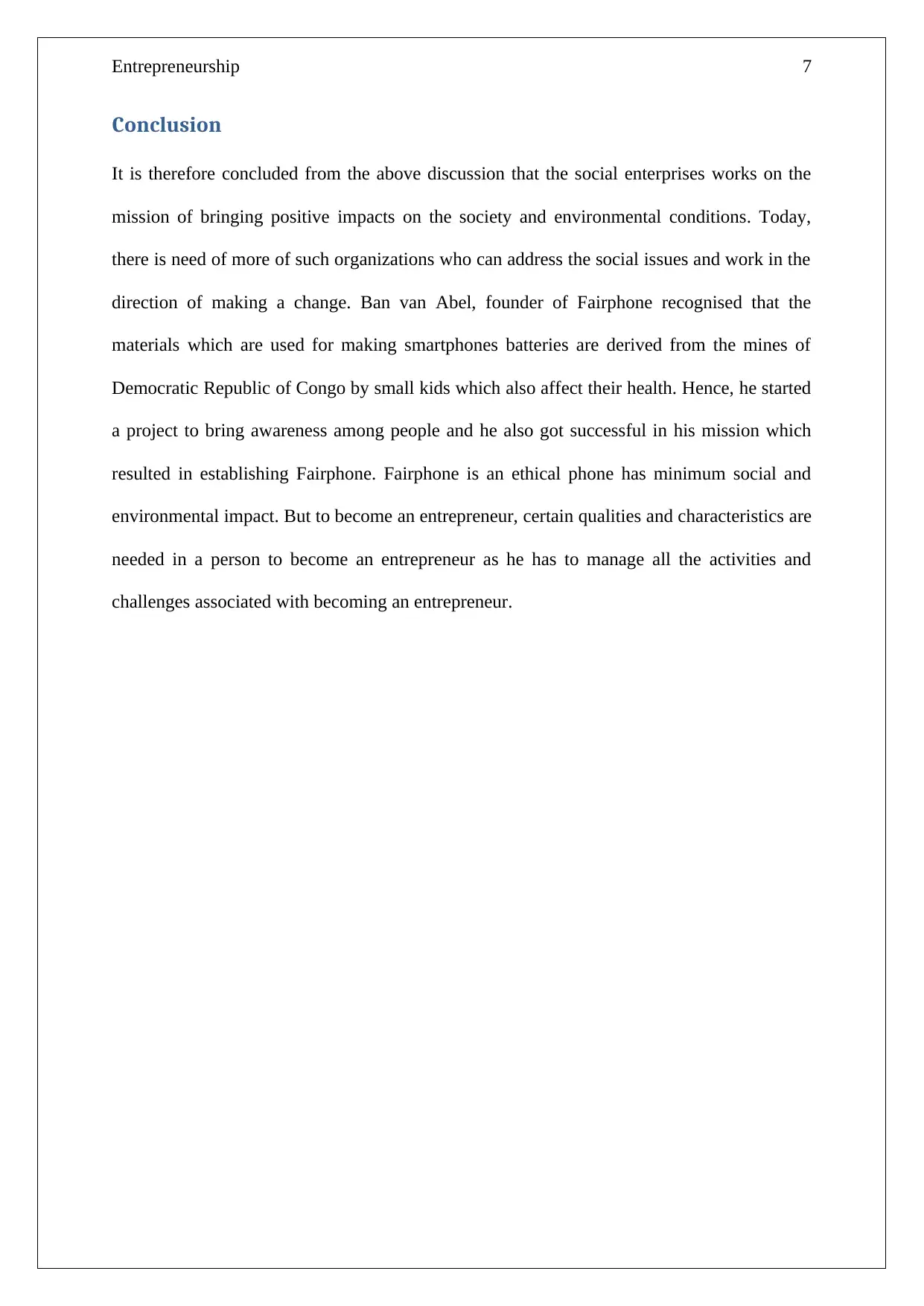
Entrepreneurship 7
Conclusion
It is therefore concluded from the above discussion that the social enterprises works on the
mission of bringing positive impacts on the society and environmental conditions. Today,
there is need of more of such organizations who can address the social issues and work in the
direction of making a change. Ban van Abel, founder of Fairphone recognised that the
materials which are used for making smartphones batteries are derived from the mines of
Democratic Republic of Congo by small kids which also affect their health. Hence, he started
a project to bring awareness among people and he also got successful in his mission which
resulted in establishing Fairphone. Fairphone is an ethical phone has minimum social and
environmental impact. But to become an entrepreneur, certain qualities and characteristics are
needed in a person to become an entrepreneur as he has to manage all the activities and
challenges associated with becoming an entrepreneur.
Conclusion
It is therefore concluded from the above discussion that the social enterprises works on the
mission of bringing positive impacts on the society and environmental conditions. Today,
there is need of more of such organizations who can address the social issues and work in the
direction of making a change. Ban van Abel, founder of Fairphone recognised that the
materials which are used for making smartphones batteries are derived from the mines of
Democratic Republic of Congo by small kids which also affect their health. Hence, he started
a project to bring awareness among people and he also got successful in his mission which
resulted in establishing Fairphone. Fairphone is an ethical phone has minimum social and
environmental impact. But to become an entrepreneur, certain qualities and characteristics are
needed in a person to become an entrepreneur as he has to manage all the activities and
challenges associated with becoming an entrepreneur.
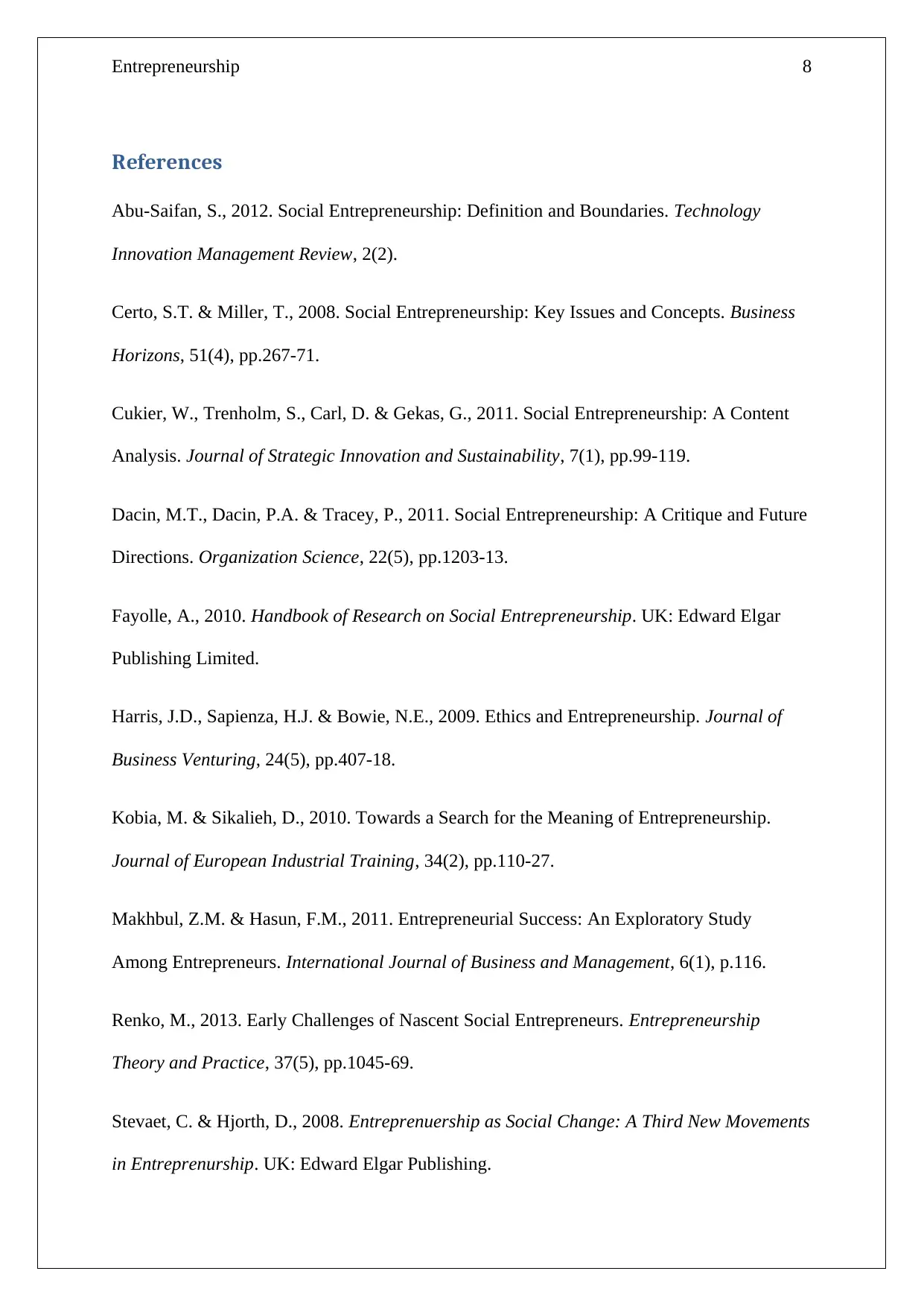
Entrepreneurship 8
References
Abu-Saifan, S., 2012. Social Entrepreneurship: Definition and Boundaries. Technology
Innovation Management Review, 2(2).
Certo, S.T. & Miller, T., 2008. Social Entrepreneurship: Key Issues and Concepts. Business
Horizons, 51(4), pp.267-71.
Cukier, W., Trenholm, S., Carl, D. & Gekas, G., 2011. Social Entrepreneurship: A Content
Analysis. Journal of Strategic Innovation and Sustainability, 7(1), pp.99-119.
Dacin, M.T., Dacin, P.A. & Tracey, P., 2011. Social Entrepreneurship: A Critique and Future
Directions. Organization Science, 22(5), pp.1203-13.
Fayolle, A., 2010. Handbook of Research on Social Entrepreneurship. UK: Edward Elgar
Publishing Limited.
Harris, J.D., Sapienza, H.J. & Bowie, N.E., 2009. Ethics and Entrepreneurship. Journal of
Business Venturing, 24(5), pp.407-18.
Kobia, M. & Sikalieh, D., 2010. Towards a Search for the Meaning of Entrepreneurship.
Journal of European Industrial Training, 34(2), pp.110-27.
Makhbul, Z.M. & Hasun, F.M., 2011. Entrepreneurial Success: An Exploratory Study
Among Entrepreneurs. International Journal of Business and Management, 6(1), p.116.
Renko, M., 2013. Early Challenges of Nascent Social Entrepreneurs. Entrepreneurship
Theory and Practice, 37(5), pp.1045-69.
Stevaet, C. & Hjorth, D., 2008. Entreprenuership as Social Change: A Third New Movements
in Entreprenurship. UK: Edward Elgar Publishing.
References
Abu-Saifan, S., 2012. Social Entrepreneurship: Definition and Boundaries. Technology
Innovation Management Review, 2(2).
Certo, S.T. & Miller, T., 2008. Social Entrepreneurship: Key Issues and Concepts. Business
Horizons, 51(4), pp.267-71.
Cukier, W., Trenholm, S., Carl, D. & Gekas, G., 2011. Social Entrepreneurship: A Content
Analysis. Journal of Strategic Innovation and Sustainability, 7(1), pp.99-119.
Dacin, M.T., Dacin, P.A. & Tracey, P., 2011. Social Entrepreneurship: A Critique and Future
Directions. Organization Science, 22(5), pp.1203-13.
Fayolle, A., 2010. Handbook of Research on Social Entrepreneurship. UK: Edward Elgar
Publishing Limited.
Harris, J.D., Sapienza, H.J. & Bowie, N.E., 2009. Ethics and Entrepreneurship. Journal of
Business Venturing, 24(5), pp.407-18.
Kobia, M. & Sikalieh, D., 2010. Towards a Search for the Meaning of Entrepreneurship.
Journal of European Industrial Training, 34(2), pp.110-27.
Makhbul, Z.M. & Hasun, F.M., 2011. Entrepreneurial Success: An Exploratory Study
Among Entrepreneurs. International Journal of Business and Management, 6(1), p.116.
Renko, M., 2013. Early Challenges of Nascent Social Entrepreneurs. Entrepreneurship
Theory and Practice, 37(5), pp.1045-69.
Stevaet, C. & Hjorth, D., 2008. Entreprenuership as Social Change: A Third New Movements
in Entreprenurship. UK: Edward Elgar Publishing.

Entrepreneurship 9
1 out of 10
Related Documents
Your All-in-One AI-Powered Toolkit for Academic Success.
+13062052269
info@desklib.com
Available 24*7 on WhatsApp / Email
![[object Object]](/_next/static/media/star-bottom.7253800d.svg)
Unlock your academic potential
© 2024 | Zucol Services PVT LTD | All rights reserved.





